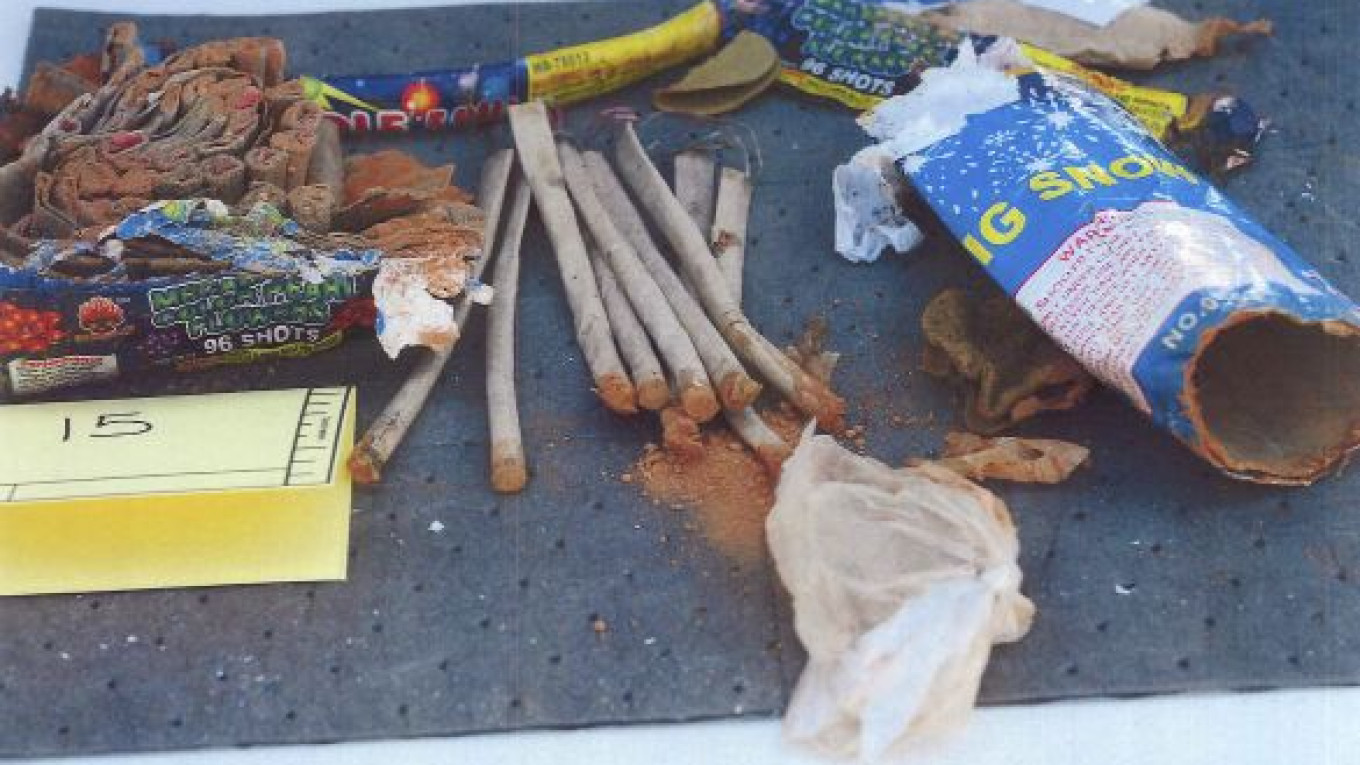BOSTON — Three college friends of Boston Marathon bombing suspect Dzhokhar Tsarnaev have been arrested and accused of removing a backpack containing hollowed-out fireworks from Tsarnaev's dorm room three days after the attack to keep him from getting into trouble.
In court papers, the FBI said one of them threw the backpack in the garbage — it was later found in a landfill by law enforcement officers — after they concluded from news reports that Tsarnaev was one of the bombers.
Azamat Tazhayakov and Dias Kadyrbayev, who are from Kazakhstan, were charged with conspiring to obstruct justice by concealing and destroying evidence. A third man, Robel Phillipos, was charged with lying to investigators about the visit to Tsarnaev's room.
At a court appearance Wednesday, the Kazakh men did not request bail and will be held for another hearing May 14. Phillipos was held for a hearing on Monday. Their lawyers refused to comment ahead of the proceeding.
Three people were killed and more than 260 injured on April 15 when two bombs exploded near the finish line. Tamerlan Tsarnaev died after a gunfight with police days later. His younger brother, Dzhokhar Tsarnaev, a 19-year-old second-year student at the University of Massachusetts at Dartmouth, was captured and lies in a prison hospital.
Investigators have not said whether the pressure cooker bombs used in the attacks were made with gunpowder extracted from fireworks.
Tazhayakov and Kadyrbayev have been held in jail for more than a week on allegations that they violated their student visas by not regularly going to class at UMassachusetts. All three men charged Wednesday began attending UMass with Tsarnaev at the same time in 2011, according to the FBI.
The three were not accused of any involvement in the bombing itself. But in a footnote in the court papers, the FBI said that about a month before the bombing, Tsarnaev told Tazhayakov and Kadyrbayev that he knew how to make a bomb.
If convicted, Kadyrbayev and Tazhayakov could get up to five years in prison and a $250,000 fine. Phillipos faces a maximum of eight years behind bars and a $250,000 fine.
Authorities allege that on the night of April 18, after the FBI released surveillance-camera photos of the bombing suspects and the three men suspected their friend was one of them, they went to Tsarnaev's dorm room.
Before Tsarnaev's roommate let them in, Kadyrbayev showed Tazhayakov a text message from Tsarnaev that read: "I'm about to leave if you need something in my room take it," according to the FBI. When Tazhayakov learned of the message, "he believed he would never see Tsarnaev alive again," the FBI said in the affidavit.
It was not clear from the court papers whether authorities believe that was an instruction from Tsarnaev to his friends to destroy evidence.
Once inside Tsarnaev's room, the men noticed a backpack containing fireworks, which had been opened and emptied of powder, the FBI said.
The FBI said Kadyrbayev knew when he saw the empty fireworks that Tsarnaev was involved in the bombings and decided to remove the backpack from the room "in order to help his friend Tsarnaev avoid trouble."
Kadyrbayev also decided to remove Tsarnaev's laptop "because he did not want Tsarnaev's roommate to think he was stealing or behaving suspiciously by just taking the backpack," the FBI said in court papers.
After the three men returned to Kadyrbayev's and Tazhayakov's apartment with the backpack and computer, they watched news reports featuring photographs of Tsarnaev.
The FBI affidavit said Kadyrbayev told authorities the three men then "collectively decided to throw the backpack and fireworks into the trash because they did not want Tsarnaev to get into trouble."
Kadyrbayev said he placed the backpack and fireworks along with trash from the apartment into a large trash bag and threw it into a garbage bin near the men's apartment.
When the backpack was later found in a landfill last week, inside it was a UMass-Dartmouth homework assignment sheet from a class Tsarnaev was taking, the FBI said.
A Message from The Moscow Times:
Dear readers,
We are facing unprecedented challenges. Russia's Prosecutor General's Office has designated The Moscow Times as an "undesirable" organization, criminalizing our work and putting our staff at risk of prosecution. This follows our earlier unjust labeling as a "foreign agent."
These actions are direct attempts to silence independent journalism in Russia. The authorities claim our work "discredits the decisions of the Russian leadership." We see things differently: we strive to provide accurate, unbiased reporting on Russia.
We, the journalists of The Moscow Times, refuse to be silenced. But to continue our work, we need your help.
Your support, no matter how small, makes a world of difference. If you can, please support us monthly starting from just $2. It's quick to set up, and every contribution makes a significant impact.
By supporting The Moscow Times, you're defending open, independent journalism in the face of repression. Thank you for standing with us.
Remind me later.


